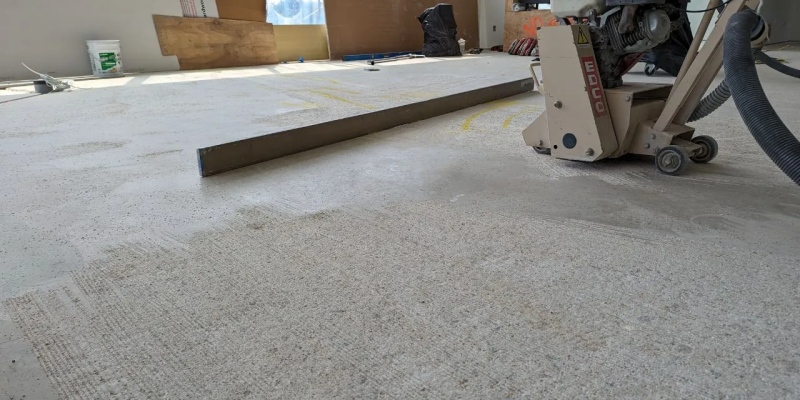
Ш§Ш№Ш·ЩЉЩ†Ш§ Ш§ШЄШµШ§Щ„
+86-18059236229Ш§Ш±ШіЩ„ Щ„Щ†Ш§ Ш№ШЁШ± Ш§Щ„ШЁШ±ЩЉШЇ Ш§Щ„ШҐЩ„ЩѓШЄШ±Щ€Щ†ЩЉ
info@transgrind.comШ§Щ„Щ‡ШЇЩЃ Ш§Щ„Ш±Ш¦ЩЉШіЩЉ Щ…Щ† ШµЩ‚Щ„ Щ€ШЄЩ„Щ…ЩЉШ№ Ш§Щ„Ш®Ш±ШіШ§Щ†Ш© Щ‡Щ€ Ш§Щ„ШШµЩ€Щ„ Ш№Щ„Щ‰ ШіШ·Ш ШЈЩ…Щ„Ші Щ€Щ…ШЄШ¬Ш§Щ†Ші. Щ€Щ…Ш№ Ш°Щ„ЩѓШЊ Щ‚ШЇ ШЄЩ†ШґШЈ Щ†ШЄШ§Ш¦Ш¬ ШєЩЉШ± Щ…ШЄШіШ§Щ€ЩЉШ© Щ†ШЄЩЉШ¬Ш© Ш№Щ€Ш§Щ…Щ„ Щ…Ш®ШЄЩ„ЩЃШ©ШЊ Щ…Щ†Щ‡Ш§ ШіЩ€ШЎ Ш§Ш®ШЄЩЉШ§Ш± Ш§Щ„ШЈШЇЩ€Ш§ШЄ Щ€Ш§Щ„ШЄШ№Ш§Щ…Щ„ Щ…Ш№ Ш§Щ„ШўЩ„Ш§ШЄ. ШҐЩ† ШҐШЇШ±Ш§Щѓ Ш§Щ„ШЈШіШЁШ§ШЁ Ш§Щ„ШґШ§Ш¦Ш№Ш© Щ€Щ…Ш№Ш±ЩЃШ© ЩѓЩЉЩЃЩЉШ© Щ…Ш№Ш§Щ„Ш¬ШЄЩ‡Ш§ ЩЉЩЏШШіЩ‘Щ† Ш§Щ„ЩѓЩЃШ§ШЎШ©ШЊ Щ€ЩЉЩ€ЩЃШ± Ш§Щ„Щ€Щ‚ШЄШЊ Щ€ЩЉЩЏЩ‚Щ„Щ„ Щ…Щ† ШЄЩѓЩ„ЩЃШ© ШҐШ№Ш§ШЇШ© Ш§Щ„Ш№Щ…Щ„.
ШЄШШЇЩЉШЇ Ш§Щ„ШЈШіШЁШ§ШЁ
ШєШ§Щ„ШЁЩ‹Ш§ Щ…Ш§ ЩЉШЁШЇШЈ Ш§Щ„Ш·ШЩ† ШєЩЉШ± Ш§Щ„Щ…ШЄШіШ§Щ€ЩЉ ШЁШ§ШіШЄШ®ШЇШ§Щ… Ш§Щ„ШЈШЇЩ€Ш§ШЄ Ш§Щ„Ш®Ш§Ш·Ш¦Ш©. ШЈШЇШ§Ш© Ш·ШЩ† Ш§Щ„Щ…Ш№Ш§ШЇЩ† Щ„Щ„ШЈШ±Ш¶ЩЉШ§ШЄ Щ‚ШЇ ЩЉШ¤ШЇЩЉ Ш§ШіШЄШ®ШЇШ§Щ… ШµЩ„Ш§ШЁШ© ШЈЩ€ ШШµЩ‰ ШєЩЉШ± Щ…Щ†Ш§ШіШЁШ© Щ„Щ„ШіШ·Ш ШҐЩ„Щ‰ ШёЩ‡Щ€Ш± ШЁЩ‚Ш№ Щ…Ш±ШЄЩЃШ№Ш©ШЊ ШЈЩ€ ШЈЩ†Щ…Ш§Ш· Ш®ШЇЩ€Шґ ШєЩЉШ± Щ…ШЄЩ†Ш§ШіЩ‚Ш©ШЊ ШЈЩ€ ШЄШўЩѓЩ„ Щ…ШЁЩѓШ±. ЩЉЩЏШ№ШЇЩ‘ ШЄЩ€Ш§ШІЩ† Ш§Щ„ШўЩ„Ш© ШЈЩ…Ш±Щ‹Ш§ ШЁШ§Щ„Шє Ш§Щ„ШЈЩ‡Щ…ЩЉШ© ШЈЩЉШ¶Щ‹Ш§Ш› ЩЃШҐШ°Ш§ Щ„Щ… ШЄЩѓЩ† Ш§Щ„Щ…Ш·ШЩ†Ш© Щ…ШіШЄЩ€ЩЉШ© ШЈЩ€ Ш°Ш§ШЄ Щ€ШІЩ† Щ…Щ†Ш§ШіШЁШЊ ЩЉШµШЁШ ШЄЩ€ШІЩЉШ№ Ш§Щ„Ш¶ШєШ· ШєЩЉШ± Щ…ШЄШіШ§Щ€ЩЌ. Ш№Щ„Ш§Щ€Ш© Ш№Щ„Щ‰ Ш°Щ„ЩѓШЊ ШЄШ¤Ш«Ш± ШЄЩ‚Щ†ЩЉШ© Ш§Щ„Щ…ЩЏШґШєЩ‘Щ„ - Щ…Ш«Щ„ ШЄШЇШ§Ш®Щ„ Ш§Щ„ШЄЩ…Ш±ЩЉШ±Ш§ШЄ ШЁШґЩѓЩ„ ШµШЩЉШ Щ€Ш§Щ„ШЩЃШ§Шё Ш№Щ„Щ‰ ШШ±ЩѓШ© Ш«Ш§ШЁШЄШ© - ШЁШґЩѓЩ„ Щ…ШЁШ§ШґШ± Ш№Щ„Щ‰ Ш¬Щ€ШЇШ© Ш§Щ„ШіШ·Ш Ш§Щ„Щ†Щ‡Ш§Ш¦ЩЉ.
ШҐШµЩ„Ш§Ш Щ…ШґШ§ЩѓЩ„ Ш§Щ„ШЈШЇЩ€Ш§ШЄ Щ€Ш§Щ„ШўЩ„Ш§ШЄ
ЩЉЩЏШ№ШЇ Ш§Ш®ШЄЩЉШ§Ш± ШЈШЇШ§Ш© Ш§Щ„Щ…Ш§Ші Ш§Щ„Щ…Щ†Ш§ШіШЁШ© ШЈЩ…Ш±Щ‹Ш§ ШЁШ§Щ„Шє Ш§Щ„ШЈЩ‡Щ…ЩЉШ© Щ„Щ„ШШµЩ€Щ„ Ш№Щ„Щ‰ Щ†ШЄШ§Ш¦Ш¬ Ш«Ш§ШЁШЄШ©. Ш№Щ„Щ‰ ШіШЁЩЉЩ„ Ш§Щ„Щ…Ш«Ш§Щ„ШЊ Щ‚ШЇ ШЄШЄШўЩѓЩ„ Ш§Щ„ШЈШЇЩ€Ш§ШЄ Ш°Ш§ШЄ ШµЩ„Ш§ШЁШ© Ш§Щ„ШЄШ±Ш§ШЁШ· ШєЩЉШ± Ш§Щ„Щ…Щ†Ш§ШіШЁШ© ШЁШіШ±Ш№Ш© Ш№Щ„Щ‰ Ш§Щ„Ш®Ш±ШіШ§Щ†Ш© Ш§Щ„Щ„ЩЉЩ†Ш© ШЈЩ€ ШЄШµШЁШ Щ…ШІШ¬Ш¬Ш© Ш№Щ„Щ‰ Ш§Щ„ШЈШіШ·Ш Ш§Щ„ШµЩ„ШЁШ©. Ш§Щ„ЩЃШШµ Ш§Щ„ШЇЩ€Ш±ЩЉ ШЈШЇШ§Ш© Ш±ШЁШ· Ш§Щ„Щ…Ш№Ш§ШЇЩ† Ш§Щ„Ш®Ш±ШіШ§Щ†ЩЉШ© ШЁШ§Щ„Щ…Ш§Ші ЩЉШіШ§Ш№ШЇ Ш§Щ„ШЄШўЩѓЩ„ Щ€ШҐШ№ШЇШ§ШЇ Ш§Щ„ШўЩ„Ш© Ш№Щ„Щ‰ Щ…Щ†Ш№ Щ‡Ш°Щ‡ Ш§Щ„Щ…ШґШ§ЩѓЩ„. ШЄЩ‚ШЇЩ… Ш№Щ„Ш§Щ…Ш§ШЄ ШЄШ¬Ш§Ш±ЩЉШ© Щ…Ш«Щ„ ШЄШ±Ш§Щ†ШіШєШ±ЩЉЩ†ШЇ ШЄШµЩ…ЩЉЩ…Ш§ШЄ ШЇЩ‚ЩЉЩ‚Ш© ШЈШЇЩ€Ш§ШЄ Ш·ШЩ† Ш§Щ„Щ…Ш§Ші Ш§Щ„ШЄЩЉ ШЄШЇШ№Щ… Ш§Щ„ШЈШЇШ§ШЎ Ш§Щ„Щ…ШЄШіЩ‚ Ш№ШЁШ± ШёШ±Щ€ЩЃ Ш§Щ„ШЁЩ„Ш§Ш·Ш© Ш§Щ„Щ…Ш®ШЄЩ„ЩЃШ©ШЊ Щ…Щ…Ш§ ЩЉЩ‚Щ„Щ„ Щ…Щ† Ш№Щ„Ш§Щ…Ш§ШЄ Ш§Щ„Ш·ШЩ† ШєЩЉШ± Ш§Щ„Щ…ШЄШіШ§Щ€ЩЉШ©.

Ш¶ШЁШ· Ш§Щ„ШЄЩ‚Щ†ЩЉШ© Щ€Ш§Щ„Ш№Щ…Щ„ЩЉШ©
ШЄЩ‚Щ†ЩЉШ© Ш§Щ„Щ…ЩЏШґШєЩђЩ‘Щ„ Щ„Ш§ ШЄЩ‚Щ„ ШЈЩ‡Щ…ЩЉШ©. ЩЃШ§Щ„ШЄЩ…Ш±ЩЉШ±Ш§ШЄ ШєЩЉШ± Ш§Щ„Щ…ШЄШіШ§Щ€ЩЉШ©ШЊ ШЈЩ€ ШіШ±Ш№Ш© Ш§Щ„Щ…ШґЩЉ ШєЩЉШ± Ш§Щ„Ш«Ш§ШЁШЄШ©ШЊ ШЈЩ€ Ш№ШЇЩ… Ш§Щ„ШЄШЇШ§Ш®Щ„ ШЁШґЩѓЩ„ ШµШЩЉШ Щ‚ШЇ ШЄЩЏШіШЁШЁ ШЄШґШ·ЩЉШЁШ§ШЄ ШєЩЉШ± Щ…Щ†ШЄШёЩ…Ш©. ШҐЩ† ШЄШЇШ±ЩЉШЁ Ш§Щ„Ш№Щ…Ш§Щ„ Ш№Щ„Щ‰ Ш§Щ„ШЩЃШ§Шё Ш№Щ„Щ‰ ШШ±ЩѓШ© ШЈЩ…Ш§Щ…ЩЉШ© Ш«Ш§ШЁШЄШ©ШЊ Щ€ШЄШЇШ§Ш®Щ„ Щ…ЩЏШЄШіЩ‚ШЊ Щ€ШіШ±Ш№Ш© Щ…ЩЏЩ†ШЄШёЩ…Ш© ЩЉЩЏЩ…ЩѓЩ† ШЈЩ† ЩЉЩЏШШіЩ‘Щ† Ш§Щ„Щ†ШЄШ§Ш¦Ш¬ ШЁШґЩѓЩ„ Щ…Щ„ШЩ€Шё. ЩЃЩЉ Ш§Щ„Ш·ШЩ† Ш§Щ„Ш±Ш·ШЁШЊ ШЄЩЏШ№ШЇЩ‘ ШҐШЇШ§Ш±Ш© ШЄШЇЩЃЩ‚ Ш§Щ„Щ…ЩЉШ§Щ‡ ШЁШ§Щ„ШЄШіШ§Щ€ЩЉ ШЈЩ…Ш±Щ‹Ш§ Ш¶Ш±Щ€Ш±ЩЉЩ‹Ш§ ШЈЩЉШ¶Щ‹Ш§ Щ„Щ…Щ†Ш№ ШёЩ‡Щ€Ш± Ш®Ш·Щ€Ш· Ш№Щ„Щ‰ Ш§Щ„ШіШ·Ш ШЈЩ€ ШЄШ±Ш§ЩѓЩ… Ш§Щ„Щ…Щ„Ш§Ш·.
Ш¶Щ…Ш§Щ† Ш§Щ„Ш§ШЄШіШ§Щ‚ Ш№Щ„Щ‰ Ш§Щ„Щ…ШЇЩ‰ Ш§Щ„Ш·Щ€ЩЉЩ„
Ш§Щ„ШµЩЉШ§Щ†Ш© Ш§Щ„ШЇЩ€Ш±ЩЉШ© Щ„Щ„ШўЩ„Ш§ШЄ Щ€Ш§Щ„ШЈШЇЩ€Ш§ШЄ ШЈШіШ§ШіЩЉШ© Щ„ШЄШ¬Щ†ШЁ Ш№ШЇЩ… ШЄШіШ§Щ€ЩЉ Ш§Щ„ШЄШґШ·ЩЉШЁШ§ШЄ. ЩЉШ¶Щ…Щ† ЩЃШШµ Ш§Щ„ШЈЩ„Щ€Ш§Ш Щ€Ш§Щ„Щ…ШШ§Щ…Щ„ Щ€Щ‚Щ€Ш§Ш№ШЇ Ш§Щ„ШЈШЇЩ€Ш§ШЄ ШЄШґШєЩЉЩ„Щ‹Ш§ ШіЩ„ШіЩ‹Ш§ Щ„ШўЩ„Ш© Ш§Щ„ШЄШ¬Щ„ЩЉШ®ШЊ ШЁЩЉЩ†Щ…Ш§ ШЄЩ…Щ†Ш№ Щ…Ш±Ш§Щ‚ШЁШ© ШЄШўЩѓЩ„ Ш§Щ„ШЈШЇЩ€Ш§ШЄ Ш§Ш®ШЄЩ„Ш§Щ„ Ш§Щ„ШЄЩ€Ш§ШІЩ†. Щ…Щ† Ш®Щ„Ш§Щ„ Ш§Щ„Ш¬Щ…Ш№ ШЁЩЉЩ† Ш§Щ„Щ…Ш№ШЇШ§ШЄ Ш§Щ„Щ…Щ†Ш§ШіШЁШ© Щ€Ш§Щ„ШЄЩ‚Щ†ЩЉШ© Ш§Щ„ШіЩ„ЩЉЩ…Ш© Щ€Ш§Щ„ШµЩЉШ§Щ†Ш© Ш§Щ„ШЇЩ€Ш±ЩЉШ©ШЊ ЩЉЩ…ЩѓЩ† Щ„Щ„Щ…Щ‚Ш§Щ€Щ„ЩЉЩ† Ш§Щ„ШШµЩ€Щ„ Ш№Щ„Щ‰ Щ†ШЄШ§Ш¦Ш¬ Ш·ШЩ† Ш§ШШЄШ±Ш§ЩЃЩЉШ© Щ€Щ…ШЄШіШ§Щ€ЩЉШ© ШЁШґЩѓЩ„ Щ…Щ€Ш«Щ€Щ‚.